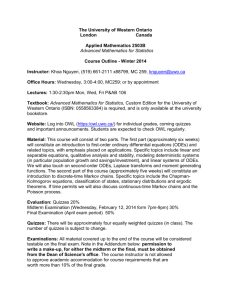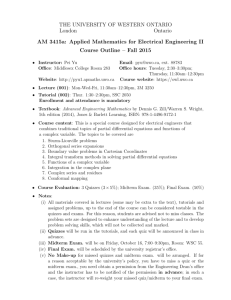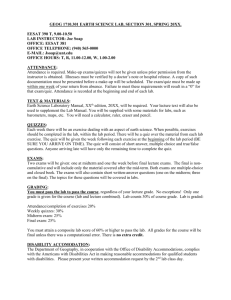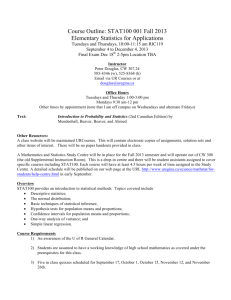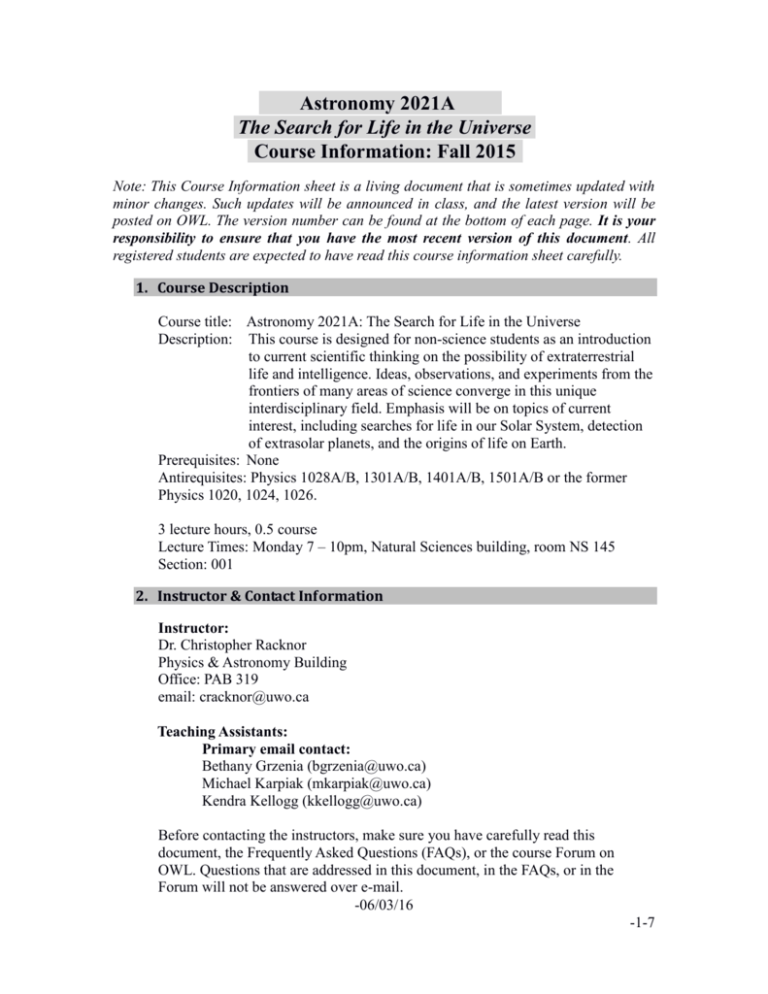
Astronomy 2021A
The Search for Life in the Universe
Course Information: Fall 2015
Note: This Course Information sheet is a living document that is sometimes updated with
minor changes. Such updates will be announced in class, and the latest version will be
posted on OWL. The version number can be found at the bottom of each page. It is your
responsibility to ensure that you have the most recent version of this document. All
registered students are expected to have read this course information sheet carefully.
1. Course Description
Course title: Astronomy 2021A: The Search for Life in the Universe
Description: This course is designed for non-science students as an introduction
to current scientific thinking on the possibility of extraterrestrial
life and intelligence. Ideas, observations, and experiments from the
frontiers of many areas of science converge in this unique
interdisciplinary field. Emphasis will be on topics of current
interest, including searches for life in our Solar System, detection
of extrasolar planets, and the origins of life on Earth.
Prerequisites: None
Antirequisites: Physics 1028A/B, 1301A/B, 1401A/B, 1501A/B or the former
Physics 1020, 1024, 1026.
3 lecture hours, 0.5 course
Lecture Times: Monday 7 – 10pm, Natural Sciences building, room NS 145
Section: 001
2. Instructor & Contact Information
Instructor:
Dr. Christopher Racknor
Physics & Astronomy Building
Office: PAB 319
email: cracknor@uwo.ca
Teaching Assistants:
Primary email contact:
Bethany Grzenia (bgrzenia@uwo.ca)
Michael Karpiak (mkarpiak@uwo.ca)
Kendra Kellogg (kkellogg@uwo.ca)
Before contacting the instructors, make sure you have carefully read this
document, the Frequently Asked Questions (FAQs), or the course Forum on
OWL. Questions that are addressed in this document, in the FAQs, or in the
Forum will not be answered over e-mail.
-06/03/16
-1-7
E-mail: OWL has an e-mail feature that you should use to contact the instructors
and/or TA’s in this course. Please do not send them regular e-mail unless it is an
emergency or you have been instructed to do so. Allow (and expect) 2-3 business
days for a reply. Note that OWL mail will not automatically be forwarded to your
Western mail account; therefore you should check your OWL mail status for
replies.
Office Hours:
Dr. Racknor: PAB 319
5:30-6:45PM every Monday
1-3PM on Monday Oct 19 & Nov 16.
Bethany Grzenia (TA): PAB 315, 8-10AM on Friday Oct 16 & Nov 13.
Michael Karpiak (TA): PAB 255, 2-4PM on Friday Oct 16 & Nov 13.
Kendra Kellogg (TA): PAB , 1-3PM on Friday Oct 16 & Nov 13.
If these times are not convenient, you can make an appointment for another
day/time, or talk to the instructor after class. If you prefer an appointment with a
TA, you can contact them through OWL.
3. Required course materials
Textbook:
Life in the Universe, 3rd Edition, by Bennet &
Shostak (Pearson-Addison Wesley). It is acceptable
to use earlier editions instead, but it is your
responsibility to be aware of the (sometimes
significant) differences with the latest edition. All
references to the textbook (e.g. page numbers,
sections) will refer to the 3rd edition. If you prefer
an electronic version of the book, access can be
purchased through the publisher’s website at
www.mypearsonstore.ca.
Additional course materials (e.g. lecture notes, slides, movie clips) will be made
available on OWL.
4. Course website
All online instructional materials as well as grades for course components will be
posted on the secure OWL site. For technical issues accessing this site in general
or this course in particular, please check out the information at the ITS website:
http://www.uwo.ca/its/ and contact ITS services if problems persist.
The OWL course website will be the only medium where additional course
-06/03/16
-2-7
materials are distributed at the appropriate time; where announcements are made
and quizzes are done; OWL is furthermore the means to get access to your marks
for various course components. Additionally, there is a course discussion forum,
and a calendar containing all important dates for this course as well as links to
useful resources.
5. Course Components, Grades & Requirements
Your final grade in this course is obtained from marks for various course
components (explained below) and calculated according to the following scheme:
Course Component
Weight
Tests & Exams
Midterm Test I
Midterm Test II
Final Exam
85%
25%
25%
35%
Quizzes (best 10 out of 12)
15%
The Department of Physics and Astronomy may, in rare cases, adjust the final
course marks in order to conform to Departmental policy.
Requirements: To pass this course, you need to obtain a final mark of at least
50%.
Grades for various components will be posted on OWL regularly; it is your
responsibility to check these grades regularly. Any errors, or appeals to your
scores, must be reported to your instructor within two weeks of their initial
posting.
6. Tests & Exams
There will be two one-hour long Midterm Tests during the year and one Final
Exam.
The dates for the Midterm Tests are given below.
Date
Midterm Test I
Mon, Oct 19, 2015
Midterm Test II Mon, Nov 16, 2015
The tests will be held during the lecture period of 7pm - 10pm, in
the regular classroom, and will be one hour long. There will be approximately
an hour of lecture given on those days as well.
The final exam is to be scheduled by the Registrar’s Office during
the Winter 2015 final examination period (Dec 11-22); exam times will be
posted on the course website when available.
-06/03/16
-3-7
Students needing to make travel arrangements are advised to book a travel date
after the end of the examination period, and avoiding the term test dates. No
make-up exams will be given to accommodate travel!
Both midterm tests and the final exam will consist of multiple-choice
questions. The scantron forms used for these exams are computer-marked and
cannot be processed when filled out in ink, therefore you should bring a pencil
to the tests and exams, and never fill out any section of these forms in ink.
Computer-marked multiple-choice tests and exams may be subject to
submission for similarity review by software that will check for unusual
coincidences in answer patterns that may indicate cheating.
You should bring your Western student ID card to all tests and exams.
Failure to do so may result in a penalty.
Only a pencil and your student ID are allowed on the tests and exams, i.e. no
extra sheets and no electronic equipment (cell phones, calculators) will be
permitted.
The tests and exams are meant to test your knowledge and understanding of the
material covered in class, all of the class slides, the corresponding textbook
sections and distributed course notes whenever appropriate. Material from the
textbook that is not discussed or explicitly referred to in class or in the notes
will not be tested on any exam.
Midterm Test I covers all the course material up to the date of the test; Midterm
Test II covers all material since Midterm Test I. The final exam is cumulative;
roughly 30% of the questions will be in-depth questions on the material since
Midterm Test II; the remaining 70% will be more general questions covering
the entire course.
7. Quizzes
A quiz will be posted online on OWL every week. Quizzes can be completed at
any computer connected to the internet, including at home. Each quiz will be
accessible from Monday 11:00pm until Sunday 11:00pm, unless announced
otherwise. Each quiz contains a certain number of problems to be solved within
an allocated time limit. The correct answers and marks for each quiz will be
released after the quiz closes. Each quiz will cover the material just discussed in
that week’s class, and any textbook material referred to in that class, unless
announced otherwise. Actual lecture material might differ from the scheduled
lecture content as described in Section 15 (below), in which case the quiz will still
cover the actual lecture material.
The best 10 out of 12 quizzes will be counted towards your quiz component of the
course, which is 15%. Thus, each quiz is worth 1.25% of your final mark. This
also means that you can forego two quizzes without penalty; consequently, there
will be no make-up quizzes.
In order to access the course materials (lectures, etc.) in OWL, you will need
to complete the OWL Course Outline Quiz, and get a perfect score. This quiz
-06/03/16
-4-7
will be available online from Monday, Sept 14, 11:00pm until Oct 11, 11:00pm,
and it counts as one of your 12 quizzes.
8. Make-up policy
You should also be aware of the following Senate regulations:
If you are unable to meet a course requirement due to illness or other serious
circumstances, you must provide valid medical or other supporting
documentation to the Dean’s office as soon as possible and contact your
instructor immediately. It is the student’s responsibility to make alternative
arrangements with their instructor once the accommodation has been
approved and the instructor has been informed. In the event of a missed final
exam, a “Recommendation of Special Examination” form must be obtained
from the Dean’s Office immediately. For further information, please see
http://www.uwo.ca/univsec/pdf/academic_policies/appeals/accommodation_medical.pdf
A student requiring academic accommodation due to illness, should use the
Student Medical Certificate when visiting an off-campus medical facility or
request a Record’s Release Form (located in the Dean’s Office) for visits to
Student Health Services. The form can be found here:
https://studentservices.uwo.ca/secure/medical_document.pdf.
Midterm Tests: To be allowed to write a make-up test, you must provide the
proper documentation to the Dean’s Office of your Faculty supporting the
reason for your absence at the scheduled test. The instructor may also require
an explanation, and possibly additional documentation, for the time interval
between the missed test and when the instructor was contacted about a makeup. Make-up tests can be of a different exam format than the regular tests.
Final Exam: In accordance with Senate Policy, a Special Examination will be
held within thirty days of the regular final examination for students who are
unable to write the regular examination for medical or other documented
reasons. Requests for such a Special Examination must be made to the
Associate Dean, Faculty of Science.
Note that if you fail to write a scheduled Special Examination, permission to
write another Special Examination will be granted only with the permission of
the Dean in exceptional circumstances and with appropriate supporting
documents. In such a case, the date of this Special Examination normally will
be the scheduled date for the final exam the next time the course is offered.
On-line Quizzes: No make-up opportunity will be offered (Section 7). Reweighting will be considered only if a student misses more than 2 quizzes and
with documentation validated in the Dean’s Office.
9. Cheating (Scholastic Offenses)
Scholastic Offenses are taken seriously and students are directed to read the
appropriate policy, specifically, the definition of what constitutes a Scholastic
Offense, at the following web site:
-06/03/16
-5-7
http://www.uwo.ca/univsec/pdf/academic_policies/appeals/scholastic_discipline_undergrad.pdf
It is a scholastic offense to cheat on a test or exam, to plagiarize a course project,
to modify marked material to falsely justify additional credit. Cheating also
includes having available any other electronic devices than a watch during a test
or exam. Committing a scholastic offense is attended by academic penalty, which
may include expulsion from the program. Computer-marked multiple-choice tests
and exams may be subject to submission for similarity review by software that
will check for unusual coincidences in answer patterns that may indicate cheating.
If you are caught cheating, there will be no second warning. Any student caught
engaging in this behavior will (1) receive a mark of zero on the course component
in question; (2) receive a mark of zero for their class participation mark, and (3)
may be subject to a further, and often quite severe, penalty.
10. Classroom Conduct
The lectures in this course are intended to provide students with an opportunity to
learn, and we expect you to respect the rights of your classmates to benefit from
the lectures by limiting your conversations to those essential to the class. Please
arrive on time, switch off your cell phones and do not leave during the lectures.
Laptops will only be allowed when used for the purpose of taking notes, and not
for any other application. Disruptive behavior in class or on OWL will not be
tolerated. Students who persist in loud, rude or otherwise disruptive or
inappropriate behavior will be asked to leave.
11. Accessibility
Please contact the course instructor if you require material in an alternate format
or if any other arrangements can make this course more accessible to you. You
may also wish to contact Services for Students with Disabilities (SSD) at 6612111 x 82147 for any specific question regarding an accommodation.
12. Accommodation for Religious Holidays
Please see the link below for the University’s policy on for accommodation due to
religious holidays.
http://www.uwo.ca/univsec/pdf/academic_policies/appeals/accommodation_religious.pdf
13. Complaints and Suggestions
If you have a concern about something, please let us know. We rely on your
feedback. Please contact initially the person most concerned – this will usually be
your instructor. If that is not satisfactory, or if there is something more general
bothering you, talk it over with the Physics & Astronomy Department Chair or the
Associate Chair of Undergraduate Studies (for contact information see
http://www.physics.uwo.ca).
14. Your Grade
You earn your grade for completing course requirements, and for having gained a
good knowledge and understanding of the course material. To maximize this
grade, you should:
1)
2)
3)
4)
5)
6)
read the lecture notes and/or assigned textbook reading before each class;
attend class regularly, and ask questions!;
review past lectures regularly;
do all of the quizzes on time;
answer all of the summary questions in your textbook;
seek regular help for material that you do not understand.
On average, this should take up about 6—9 hours per week. Check the course
website and follow discussions on the forum. In addition, it pays off to learn how
to best approach writing multiple choice exams. Helpful tips are provided on the
website of the Student Development Centre:
http://www.sdc.uwo.ca/learning/index.html?mcwrit.
If you find that you are falling behind or are having difficulties with the course
material, please contact your instructor or a TA immediately. A lot can be done in
October, much less can be done in December.
15. Lecture Topics – Course Content (Fall 2015)
Below is a provisional list of lecture topics and course content; actual lectures
might differ. One quiz will be posted every (numbered) week.
Course Reading/Lecture Schedule
1
Sept 14
2
Sept 21
3
Sept 28
Introduction to the course
and to Astrobiology
Science of Life in the
Universe
Habitability of Earth
4
Oct 5
Nature of Life
Ch 1
Ch 3.4
Ch 2
Ch 3.2
Ch 3.3-3.5
Ch 4
Ch 5
5
Oct 12
Oct 19
Thanksgiving – no lecture
Origins and Evolution
Ch 6
6
Oct 26
Life in the Solar System
Ch 7
7
Nov 2
Mars
Ch 8
8
Nov 9
Jovian Moons
Ch 9
9
Nov 16
Habitability
Ch 10
10
Nov 23
Beyond the Solar System
Ch 11
11
Nov 30
Extraterrestrial Intelligence
Ch 12
12
Dec 7
Interstellar Travel & Review
Ch 13
Dec ??
Final Exam – cumulative (35%)
Midterm Test 1 (Ch 1–5;
during lecture hours; 25%)
Midterm Test 2 (Ch 6–9;
during lecture hours; 25%)


